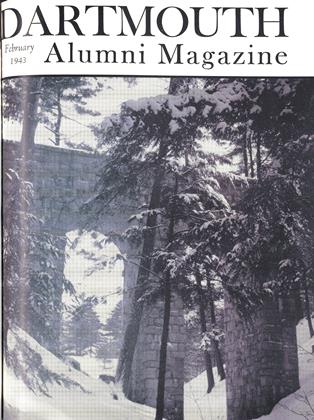Beveridge Report Features Plan for Social Security; Jaffin Essay Argues for Pan-Americanadian Union
ASA LAYMAN I find the Beveridge Report (Social Insurance and Allied Services) rather heavy going. However, it is well worth looking over and a photographic reproduction is now available here in America. "The main feature of the plan for Social Security is a scheme of social insurance against interruption and destruction of earning power and for special expenditure arising at birth, marriage or death. The scheme embodies six fundamental principles: flat rate of subsistence benefit; flat rate of contribution; unification of administrative responsibility; adequacy of benefit; comprehensiveness; and classification. These principles are explained in paras. 303-309. (Pages 121-122 and too long to quote here.) Based on them and in combination with national assistance and voluntary insurance as subsidiary methods, the aim of the Plan for Social Security is to make want under any circumstances unnecessary."
Some of Beveridge's ideas may be found in the writings of the American pamphleteer, Thomas Paine; others in the Communistic Manifesto, and many have been drawn from England's own experiments of the last forty years. Someday if we are good, and not too reactionary (as after the last war), we'll have something like this, too. But I find it hard to believe that we have seen the end of the pukka sahib yet. The report runs to exactly 299 pages. Macmillan is the publisher.
The Columbia Law Review printed in 1942 an interesting essay by George Jaffin called New World Constitutional Harmony: A Pan-Americanadian Panorama. This little essay of 53 pages, crammed with scholarly footnotes, deals primarily with constitutional guarantees of individual liberties and puts emphasis upon common roots and fundamental similarities rather than upon differences in detail between the legal systems coexisting in the Western Hemisphere. Mr. Jaffin argues that the cradle of constitutional democracy was Athens, and that the American constitution was anticipated more than 2000 years ago. That we should form a Pan-Americanadian union is self evident. That we may successfully do so is helped immeasurably by the fact that by 1823 the new republics of Latin-America were guaranteed by the Monroe doctrine and were enabled to develop constitutional self government. Furthermore the American constitutional ideology replaced the old world political ideology. Mr. Jaffin wants a Pan-Americanadian constitutional confederation and he believes that common constitutional aspirations transcend differences in language. Mr. Jaffin writes with a trained legal mind and his essay deserves, and I hope will get, serious thought and consideration. I wonder what Mr. Nelson Rockefeller would think of it.
Two books which should be read together are O. D. Gallagher's Action in theEast (Doubleday, 1942), and Cecil Brown's Suez to Singapore. Both correspondents were on the "Repulse" when it went down, and both witnessed many of the same events. I hope Gallagher is right when he writes: "The bloody triumph of Japanese arms will be brief. She has beaten us so far because we were unready." So writes a South African. Cecil Brown notes the incredible overconfidence, stupidity, and courage of the British who lost Singapore and Malaya to a smarter, more determined, and better prepared enemy. He begins in the Middle East and then goes to the Far East. In both places he found almost hopeless barriers of censorship. Gallagher's book is easier to read, but you will probably enjoy Brown's book more.
Hesketh Pearson's G.B.S. (Harper, 1942) is a most entertaining biography of the wittiest and shrewdest mind of his time. By all means read it.
Margaret Mead's And Keep Your Powder Dry (Morrow) is a picture of how America looks to an anthropologist. This is a highly intelligent analysis of the American character especially in its relation to the war and the world to come with the peace. "If we are to fight," she writes, "if we are to win, if we are to hold before us as we fight a goal we will count worth fighting for, that goal must be phrased in American terms, in that mixture of faith in the right and faith in the power of science: Trust God—and keep your powder dry."
I enjoyed Julian Green's Memories ofHappy Days (Harper). Does this not ring true to you? In speaking of his father he wrote: "He was the kindest and most considerate of fathers, and I had good reason to mourn him, but it took a number of years and a much greater experience of life than I had then for me to realize that he was one of the best men I had ever known. When I was a boy, I took it for granted that all men were as honest as he was and had as great a heart; I had much to learn."
 View Full Issue
View Full Issue
More From This Issue
-
 Article
ArticleSulzberger Addresses 1943
February 1943 -
 Article
Article'Round the Girdled Earth
February 1943 By Herbert F. West '22. -
 Article
ArticleColleges Will be Used for Military Training
February 1943 By LLOYD K. NEIDLINGER '23 -
 Article
ArticleGovernment War Work
February 1943 -
 Class Notes
Class Notes1939
February 1943 By RICHARD S. JACKSON -
 Class Notes
Class Notes1929
February 1943 By F. WILLIAM ANDRES
HERBERT F. WEST '22
-
 Article
ArticleHanover Browsing
May 1939 By HERBERT F. WEST '22 -
 Article
ArticleHanover Browsing
October 1946 By HERBERT F. WEST '22 -
 Article
ArticleHanover Browsing
March 1950 By HERBERT F. WEST '22 -
 Article
ArticleHanover Browsing
April 1954 By HERBERT F. WEST '22 -
 Article
ArticleHanover Browsing
January 1956 By HERBERT F. WEST '22 -
 Article
ArticleHanover Browsing
March 1958 By HERBERT F. WEST '22








